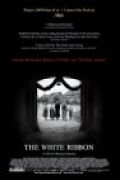
Austria/Germany/France/Italy 2009
Directed by
Michael Haneke
144 minutes
Rated M
Reviewed by
Sharon Hurst

The White Ribbon
Synopsis: In the 15 months preceding WW1 in a small German village ruled over by an autocratic baron (Ulrich Tukur), strange incidents and “accidents” start happening. First the local doctor is dislodged from his horse due to a deliberately set trip wire. Other nasty incidents follow – a retarded child is maimed; a barn is burned down; someone dies in a mill accident; a crop of cabbages is destroyed. The village teacher (Christian Friedel) observes all this and narrates the voice over. Meantime the stern pastor (Burghart Klaussner) punishes his recalcitrant children by sending them all to bed without food and ties a white ribbon around their arms to remind them to be virtuous.Michael Haneke (Hidden, The Piano Teacher, Funny Games) is well known for his enigmatic films and distinctive style of film-making. He often leaves the audience to try to figure out what is going on with his characters, and indeed with the plot. So it is with this latest offering, which has taken out some heavy-duty awards.
White Ribbon will not be to everyone's taste. It is relentlessly slow (albeit carefully crafted) and at 144 minutes one needs to concentrate. Which is not to say I wasn't fascinated by much of the story. There is certainly a sense of evil lurking in this village, and I felt as if many of the children could possibly be responsible for some of the mayhem caused. But we never know. That is part of the film's intrigue and suspense. The whole issue of order and rebellion in a tightly constrained society looms large. The children are brutalized by adults (but we also sense they have wicked streaks within them) whilst the film explores questions such as:. How does one preserve order? What happens when fear and suspicion grow among a society? Is too much discipline a bad thing?
Many people are trying to read German history into the plot. Haneke seems to be inviting us to look at the fact that these kids will grow up to become the adults of WWII. In an interview Haneke has spoken of exploring the psychological preconditions of people following Fascism. He also speaks negatively of the Church as a punitive and aggressive institution. Certainly the character of the pastor reflects this. All these themes are there to be examined along with other themes such as that captured by impressive sequences such as one where a child first becomes aware of the fact that death is a part of life. Another alarming scene involves the seemingly respectable doctor being unmitigatingly cruel to his mistress, the local midwife.
For me the film's strongest point is its breathtakingly beautiful black and white cinematography. Much use is made of shadow, with careful lingering upon scenes. Often it is what we don't see that is of great interest, such as a long shot of a closed door, with only the sounds of what happens within that room. Many of the shots are like a perfect and highly artistic still photograph.
This film is certainly one that intrigues and impresses, but like Haneke's Hidden, the abrupt ending left me asking “What on earth happened?”

Want more about this film?


Want something different?




